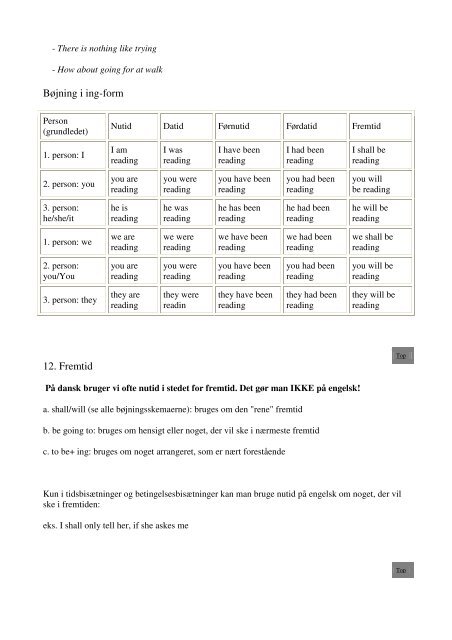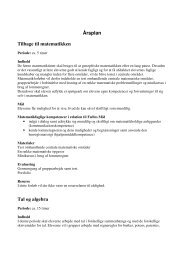Denne side er bygget op efter vores arbejdsbog The New ... - Flexiweb
Denne side er bygget op efter vores arbejdsbog The New ... - Flexiweb
Denne side er bygget op efter vores arbejdsbog The New ... - Flexiweb
You also want an ePaper? Increase the reach of your titles
YUMPU automatically turns print PDFs into web optimized ePapers that Google loves.
- Th<strong>er</strong>e is nothing like trying<br />
- How about going for at walk<br />
Bøjning i ing-form<br />
P<strong>er</strong>son<br />
(grundledet)<br />
1. p<strong>er</strong>son: I<br />
2. p<strong>er</strong>son: you<br />
3. p<strong>er</strong>son:<br />
he/she/it<br />
1. p<strong>er</strong>son: we<br />
2. p<strong>er</strong>son:<br />
you/You<br />
3. p<strong>er</strong>son: they<br />
12. Fremtid<br />
Nutid Datid Førnutid Førdatid Fremtid<br />
I am<br />
reading<br />
you are<br />
reading<br />
he is<br />
reading<br />
we are<br />
reading<br />
you are<br />
reading<br />
they are<br />
reading<br />
I was<br />
reading<br />
you w<strong>er</strong>e<br />
reading<br />
he was<br />
reading<br />
we w<strong>er</strong>e<br />
reading<br />
you w<strong>er</strong>e<br />
reading<br />
they w<strong>er</strong>e<br />
readin<br />
I have been<br />
reading<br />
you have been<br />
reading<br />
he has been<br />
reading<br />
we have been<br />
reading<br />
you have been<br />
reading<br />
they have been<br />
reading<br />
I had been<br />
reading<br />
you had been<br />
reading<br />
he had been<br />
reading<br />
we had been<br />
reading<br />
you had been<br />
reading<br />
they had been<br />
reading<br />
På dansk brug<strong>er</strong> vi ofte nutid i stedet for fremtid. Det gør man IKKE på engelsk!<br />
a. shall/will (se alle bøjningsskema<strong>er</strong>ne): bruges om den "rene" fremtid<br />
b. be going to: bruges om hensigt ell<strong>er</strong> noget, d<strong>er</strong> vil ske i nærmeste fremtid<br />
c. to be+ ing: bruges om noget arrang<strong>er</strong>et, som <strong>er</strong> nært forestående<br />
I shall be<br />
reading<br />
you will<br />
be reading<br />
he will be<br />
reading<br />
we shall be<br />
reading<br />
you will be<br />
reading<br />
they will be<br />
reading<br />
Kun i tidsbisætning<strong>er</strong> og betingelsesbisætning<strong>er</strong> kan man bruge nutid på engelsk om noget, d<strong>er</strong> vil<br />
ske i fremtiden:<br />
eks. I shall only tell h<strong>er</strong>, if she askes me<br />
T<strong>op</strong><br />
T<strong>op</strong>



